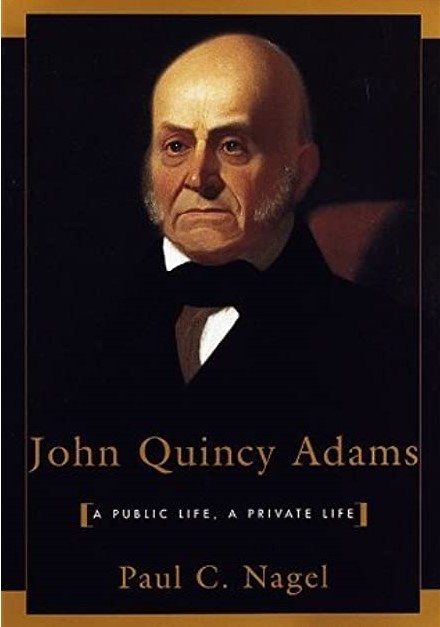“Could I have chosen my own genius and condition, I should have made myself a great poet.”
Diary entry, October 1816
Finishing the “Founder Presidents” signaled another landmark in the quest. This thing is on for real. I wondered initially if these early biographies would keep my interest. Not only did they keep me turning pages, I already have a follow-up list of books, individuals, pieces of legislation and court cases to read up on that is longer than the biography quest itself. Getting through all the books will be the easy part. Following up on everything that interests me within them…. I might need to upgrade my WordPress contract.
John Quincy Adams had an incredible life. By incredible I mean it literally, it is almost unbelievable that someone had this amazing a life. Luckily for posterity, JQA’s father insisted his son keep a journal and Paul Nagel’s John Quincy Adams: A Public Life, A Private Life unlocks the treasures of decades of 19th century note taking. The book weaves together critical points of John Qunicy’s public service with his real-time thoughts on the situation, adding in correspondence from his (overbearing) parents and wife and provides the reader with an intimate portrait rarely afforded to posterity of those living before the age of 24-hour news cycles.
It is tempting to start this post with something contemporarily topical: a contested election. The 1824 election is an all-timer for intrigue, politicking and general shenanigans. But we’ll get to that. To grasp the arc of JQA’s existence, we’ll start with a childhood that would be remarkable even today.
When John Quincy Adams was seven years old he watched the Battle of Bunker Hill from a hill near his house. When he was eleven, he accompanied his father to Paris and became so good at French the elder Adams worried his firstborn would forget English. At 14, JQA went with his father’s secretary Francis Dana to St. Petersburg to try to convince Catherine the Great to recognize American independence. Young Adams acted as interpreter because Dana’s poor French could not pass muster in Catherine’s court, where the Romantic tongue was exclusively spoken. Adams’ father, of course, was his namesake John Adams; second President of the United States and on several occasions minister to powerful European countries.
The Adams’ were strict parents and they demanded a lot of their high-born son. Abigail wrote in no uncertain terms in her letters to JQA her expectations of him. Consider getting this letter from your mom about avoiding European vice, “For dear as you are to me, I had much rather you should have found your grave in the ocean you have crossed…rather than see you an immoral profligate or a graceless child.” Or this one about taking advantage of his time abroad, “It will be expected of you, my son, that as you are favored with superior advantages under the instructive eye of a tender parent, that your improvements should bear some proportion to your advantages. These are the times in which a genius would wish to live.” Maybe this gem about not being a snooty asshole, “If you are conscious to yourself that you possess more knowledge upon some subjects than others of your standing, reflect that you have had greater opportunities of seeing the world, and obtaining a knowledge of mankind than any of your contemporaries. How unpardonable would it have been in you to have been a blockhead.” Mommy dearest.
Abigail need not have worried. John Quincy translated his time abroad into a multifaceted pre-Presidential career in international relations. After learning Latin (his fourth language) he applied directly to the junior class of Harvard and was eventually admitted, graduated second in his class and taught rhetoric at the esteemed university. He served as US Minister to the Netherlands. And Prussia. And Russia. And the United Kingdom. The Prussian monarchy loved the Adams family so much that after Louisa had had several miscarriages and was finally able to deliver a healthy child in Berlin, the king ordered all traffic prohibited on the street where they lived so she could recover in peace. While in Russia, Tsar Alexander I often sought JQA’s company for private walks and conversation. In between his stints in St. Petersburg and London he swung by Ghent, Belgium…. to negotiate the peace treaty to end the War of 1812. It was only natural, then, that he would go on to become one of the most revered Secretaries of State in the history of the office and (depending on who you ask) the primary architect of the Monroe Doctrine.
John Quincy had private pursuits to match his public service record. A brilliant translator of classic works, he most wanted to be a writer who left a mark upon the world because of his scholarly words. Though he never gave himself enough credit, many of the things he wrote still stand up as impressive today. In 1899 noted bibliographer Frederick H Wilkens called Adams “the father of German studies in America” because of his work translating multiple volumes of literature. For those of you scoring at home, he gained renown translating in his fifth language.
Adams dreaded going back to the US and leaving the intellectual culture that thrived in Europe. He feared he would have to submit to public service or, worse, go back to law. In Europe he held on hope for making a living as a writer and scholar. How badly did he want to stay? In February 1811, James Madison nominated him for a vacant seat on the Supreme Court, the Senate confirmed the nomination and JQA turned it down. That’s dedication.
All this is prelude to the now-buried lead. By 1824, the Federalists had collapsed as a party. As the Presidential election approached, battle lines were being drawn. James Monroe was stepping down after the customary two terms. Without an opposition party, factional arguments turned inward and many splinters came out. It became a free for all between five men of the same party; a mud-slinging primary that lasted all the way until the general election. As Secretary of State in both Monroe administrations, many saw JQA as the heir apparent, as Jefferson, Madison and Monroe had all ascended to the Presidency after their turn at the State office. Others preferred Speaker of the House Henry Clay of Kentucky, who would later run for President twice more and help found both the Whig and Republican Parties. Another Monroe Cabinet member, William H Crawford had a strong following in his native Virginia and his adopted state of Georgia. And JQA, the lifelong abolitionist, could never really compete in the slave-holding South where Andrew Jackson was a war hero and John C Calhoun a political mainstay.
Calhoun would drop out before the election, but the other four men split the votes to the point where no man had a majority. Jackson had a plurality of electoral votes and the most popular votes among the four remaining, but without a clear majority the Constitution threw the dispute into the House of Representatives…. which was lead by now-candidate Henry Clay. Clay did not have to recuse himself, however, because only the top three vote getters advanced, leaving him with a crucial decision to make: to which candidate should he lead his supporters? Clay saw Jackson as a dangerous demagogue and Crawford as a feeble old man. His politics most aligned with Adams, and it was to Adams he would shift his supporters. Allegations of a “corrupt bargain” were immediately raised when Clay was nominated as Adams’ choice for Secretary of State. Many, especially those in the Jackson camp, viewed the election as illegitimate. While Adams wanted a national astronomical observatory, a national university and civic projects like major roads, canals and bridges, these big ideas fell on deaf, vindictive ears. The Jacksonian-controlled Congress refused to pass anything on Adams’ agenda as retribution for his “stolen” victory. Largely because of this, JQA had a truly forgettable presidency.
There is still one last remarkable chapter to John Quincy Adams’ life that merits attention. In 1828, JQA got crushed by Andrew Jackson at the ballot box. Out of a job and, presumably, with nothing else to prove in a life of public service, Adams went home to Massachusetts. Waiting for him there was an opportunity to fill one of the only government seats he never had: United States House Representative. Can you imagine a President from your lifetime that would have gone to the House as a curtain call? Let me put this in context. It would be like the Rolling Stones in the late 1970s giving up a world tour to play the local VFW circuit in Kansas City. It was unheard of! But ever the fighter, JQA couldn’t resist the chance to stay in the game. Starting in 1831, twenty-four months to the day after leaving the Oval Office, John Quincy Adams would affix himself in the House of Representatives for the next seventeen years.
In the House, JQA was driven by two major causes. First, he fought for the right to petition, which was a veiled way to fight for ending slavery at the federal level. Second, he argued crankily and constantly for a federal institution devoted to scholarship. Almost two decades would pass after his death before the Thirteenth Amendment achieved his primary goal. The second would also eventually come to pass. You’d know it as The Smithsonian Institute.
John Quincy lived a life that rivals any public servant in American history. Some of his historical unpopularity stems from his contemporary unpopularity. As a man he was brooding, self-debasing and misogynistic. As a diplomat he was impatient, stubborn and short tempered. As an old crank in the House he was irascible and often argumentative for its own sake. Throughout his life he drank heavily and was almost certainly an alcoholic; the addiction claimed the lives of his uncle, both of his brothers and two of his sons. Every president has flaws, and he wore his openly on his sleeve.
Of all the presidential biographies I read, I found myself the most disappointed that the country has largely forgotten about (or never knew in the first place) John Quincy Adams. An unremarkable presidency by an unlikeable guy clouds the view into an unbelievably amazing life. The foreign policies he shaped still affect our lives today. This multilingual scholar/lawyer/statesman/poet that abhorred slavery, championed education and valued critical infrastructure is mostly remembered as another president’s kid or as Anthony Hopkins in Amistad. Likeable or not, I think JQA deserves a deeper look.
Trivia
- Argued before the Supreme Court three different cases, including the infamous Amistad case.
- Wrote a definitive and comprehensive book on standardized weights and measures of the world and recommended what the US should do
- Adams-Onis Treaty of 1819 took ownership of Florida for $5 Million
- Wrote a series for a Boston paper to take on Thomas Paine’s The Rights of Man, warning that passion, not reason, caused individual and group political behavior and that he was against the doctrine of “popular infallibility.”
- Appointed to the US Senate, where he fought a convention which tried to lower the border with Canada to the headwaters of the Mississippi instead of the 49th parallel. Fifteen years later, as Secretary of State, he was able to formally establish the more northern boundary he had sought and it was one of his biggest accomplishments leading the State Department.
Follow-up Reading
- John Quincy Adams: Militant Spirit by James Traub
- Mr. Adams’s Last Crusade by Joseph Wheelan
- The Amistad Rebellion by Marcus Rediker

